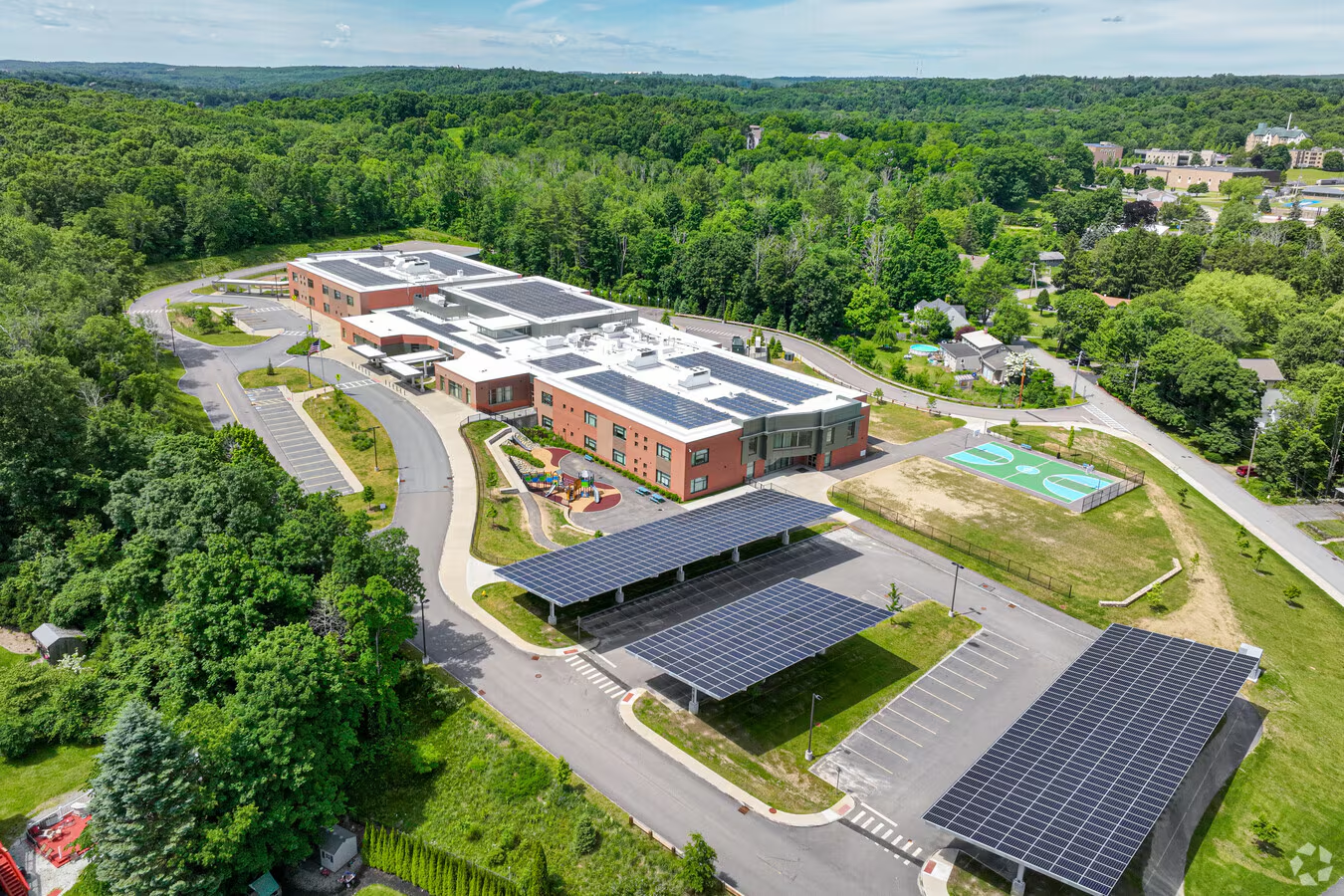The State of Massachusetts has long been a leader in supporting solar adoption. With its 2050 climate neutrality goals on the horizon, the state continues to drive solar growth through several key incentive programs. Click on each program name below to learn more.
Massachusetts SMART 3.0:
Powering the Next Chapter in Solar + Storage
SMART (Solar Massachusetts Renewable Target) is the Commonwealth’s signature solar and storage incentive program. Its latest phase, SMART 3.0, offers expanded incentives to accelerate the adoption of solar and battery storage, increase access to clean energy, and strengthen grid resilience across Massachusetts.

Prioritizing Projects in the Built Environment
- A greenfield mitigation fund that invests fees from ground-mounted projects into land conservation and biodiversity efforts
- A new >900 kW AC rooftop adder to boost incentive value for large building-mounted systems
- A new rooftop raised racking adder
- Expanded eligibility for municipal aggregation of low-income community solar
Energy Storage Is a Core Requirement
Most projects 1 MW or larger must include battery storage. These systems qualify for additional incentives and deliver key operational benefits.
- Reduce peak demand charges
- Shift energy use to lower-cost periods
- Provide backup power during grid outages
Storage is no longer an optional upgrade—it’s a central part of the state’s clean energy strategy.

How Enrollment Works
- SMART 3.0 operates on an annual cycle.
- A two-week application window opens each January.
- Annual capacity is up to 450 MW statewide, divided into groups based on project size.
- Once the capacity for a block is reached, additional applications for that block will be placed on a waitlist.
- If capacity remains after the two-week window, qualified applications will be accepted on a rolling basis until it is fully allocated.
- The waitlist feature encourages timely applications and prioritizes projects that are ready to build.
UPCOMING DEADLINE:
The application window for Program Year 2025 opens on October 15, 2025. Connect with team Solect today to explore your readiness to begin your solar journey as soon as this year.

Eligible Project Types
- Rooftop and ground-mounted solar systems
- Solar canopies and carports
- Solar-plus-storage installations
- Repowering solar arrays that are 15 years or older
- Municipal aggregation to foster low-income community solar
Stacking Incentives: SMART 3.0 + Federal ITC
Combining SMART 3.0 with the federal Investment Tax Credit (ITC) can significantly improve project economics. The ITC currently covers up to 30% or more of eligible system costs. While the ITC remains one of the most valuable clean energy incentives, it is being phased out. Aligning your project early is key to maximizing financial returns.
Timing Matters: Plan Your Solar Project Wisely
- Solar projects starting construction before July 4, 2026 are eligible for the federal ITC.
- These projects have up to 4 full calendar years from the start date to complete construction and claim the credit.
- Projects starting after July 4, 2026 can still qualify, but must be finished and operational by December 31, 2027.
- The timeline creates a clear inflection point: starting sooner gives more time and flexibility to capture the ITC.

How to Qualify for SMART 3.0
SMART 3.0 sets clear eligibility requirements to ensure incentives go to construction-ready projects.
Private sector applicants must provide:
- Executed Interconnection Service Agreement (ISA)
- All non-ministerial permits
Public sector applicants (e.g., municipalities, schools) must provide:
- A signed Letter of Intent demonstrating site control
- All non-ministerial permits
Qualified projects may apply during the open enrollment window and are evaluated based on readiness and available capacity.
Resources
Dive deeper: Explore our blog post on SMART 3.0 for a detailed breakdown of the program and how it works.
Quick overview: Download our brochure for a concise summary of SMART 3.0’s key features.
Official insights: Visit the Massachusetts government webpage for additional program details and policy updates.
Explore Your Eligibility with Solect!
Solect has extensive experience navigating SMART incentives and developing high-impact solar and storage projects across Massachusetts and the Northeast. We help organizations evaluate their eligibility, design efficient systems, and secure all available financial benefits.
Leading by Example Solar Decarbonization Grant Program
Overview: What is the Program About?
This initiative seeks to motivate Massachusetts state agencies and campuses to embrace solar photovoltaic (PV) systems, battery energy storage solutions, electric vehicle (EV) charging stations, and other decarbonization strategies. The goal is to advance broader statewide climate and sustainability objectives beyond electricity generation.
Funding Information:
The Massachusetts Department of Energy Resources (DOER) is driving and funding this program with a total allocation of $25 million. Each project can receive up to $2.5 million, including additional eligible funding. Notably, projects situated in Environmental Justice (EJ) communities can benefit from a 10% increase in total funding for solar, storage, EV charging infrastructure, and decarbonization efforts.
Eligibility:
This program is open to executive agencies, state institutions of higher education, or quasi-public state entities. Please refer to the linked webpage for a comprehensive list of eligible Massachusetts state organizations.
Application Process:
Applications will be accepted, reviewed, and awarded on a rolling basis until June 30, 2027.
Offsetting Embodied Carbon
Grant recipients must offset the estimated embodied carbon associated with the project, including emissions from producing the solar panels and steel. Embodied carbon, as defined by the EPA, refers to the greenhouse gas emissions associated with the upstream stages of a product’s life cycle, including extraction, production, transportation, and manufacturing.
Battery Energy Storage Systems (BESS)
In accordance with current SMART requirements, solar projects with a capacity of 500 kW AC or greater must evaluate and incorporate battery energy storage, unless such inclusion is deemed impractical due to technical or fiscal issues.
For additional information, please refer to the One-Pager program factsheet.
Contact Solect Energy
To discuss your eligibility and strategize an effective roadmap to leverage the LBE grant for your optimal solar success and return on investment (ROI), reach out to us today!
Why Solect: our differentiators at a glance
Excellence in quality, safety, value, and performance forms Solect’s cornerstones.
Our consistent process delivers outstanding results for our clients.
Assess project site(s) and current and future electric profile
Present analyses and recommendations on financial benefits
Contract, engineer, and
develop
Construct, interconnect, and commission projects
Optimize your solar ROI
with cutting-edge O&M services
Asset and performance management,
and compliance
